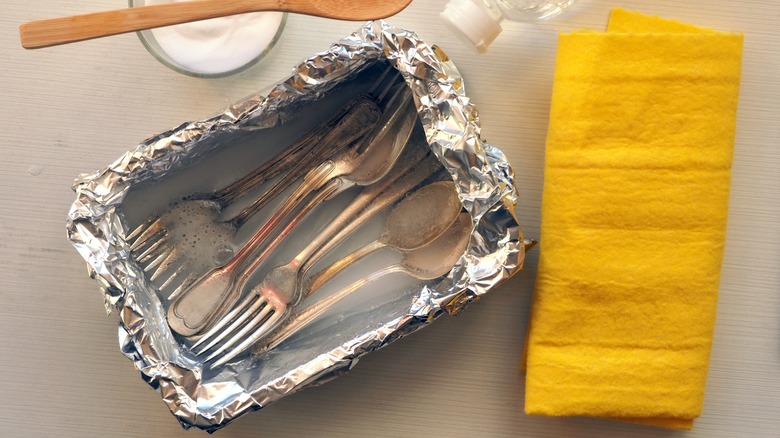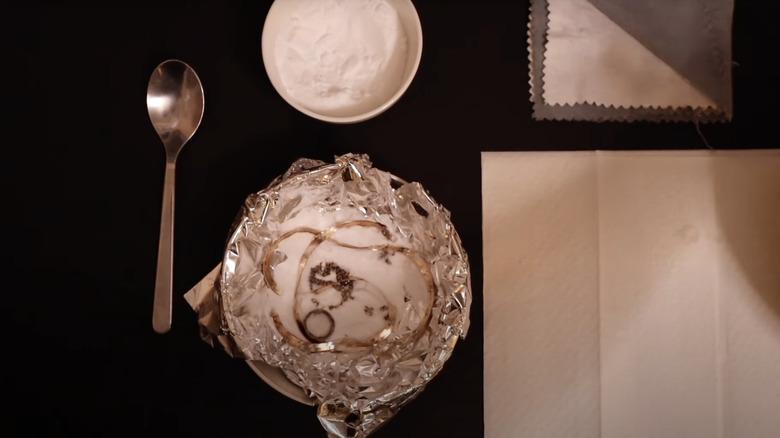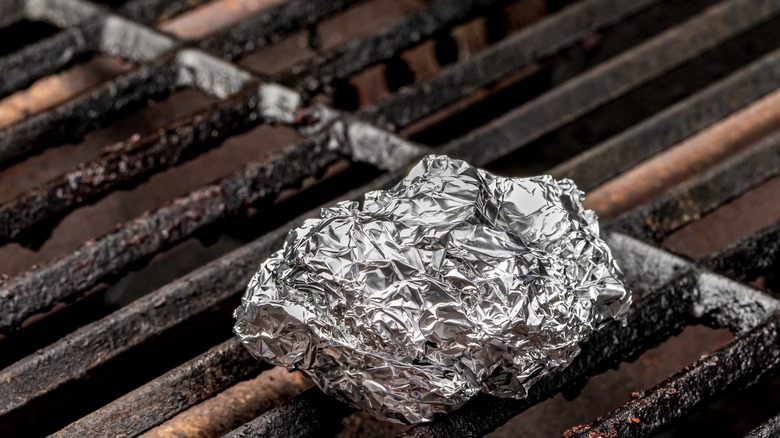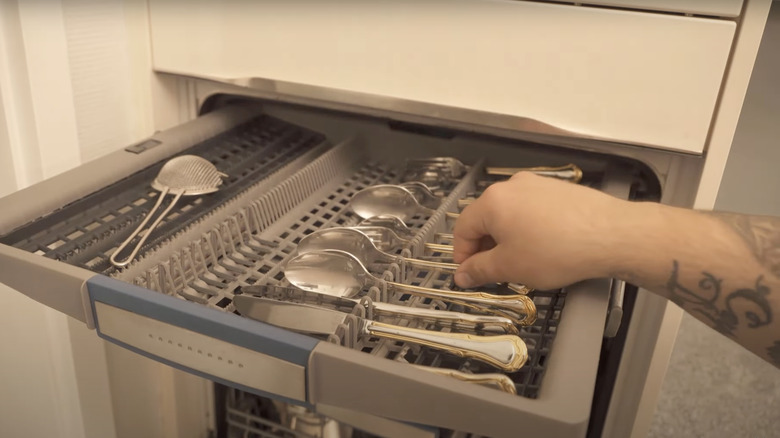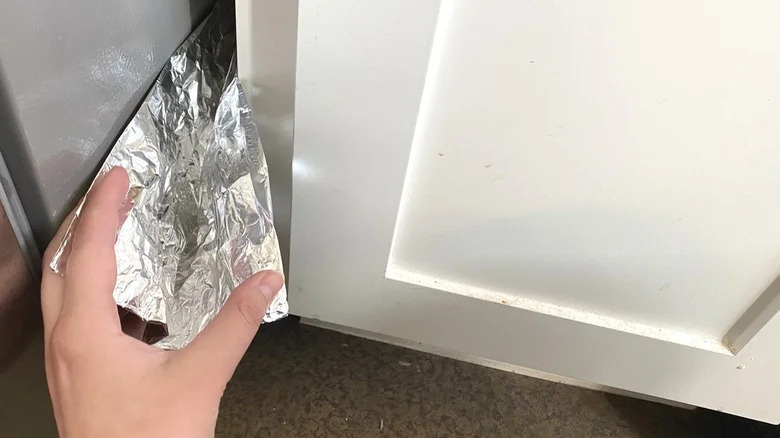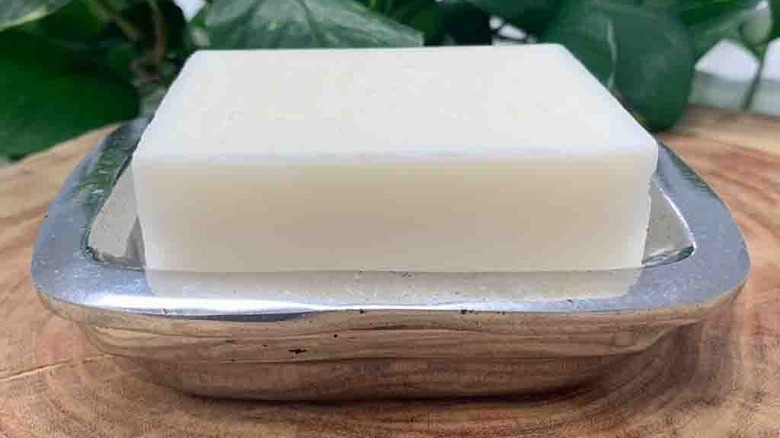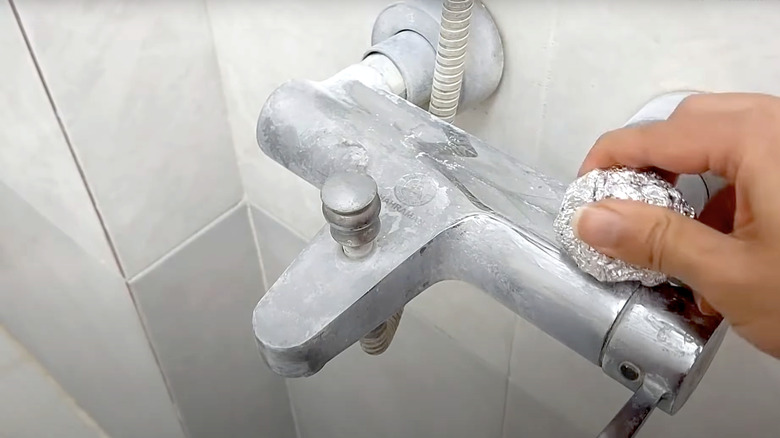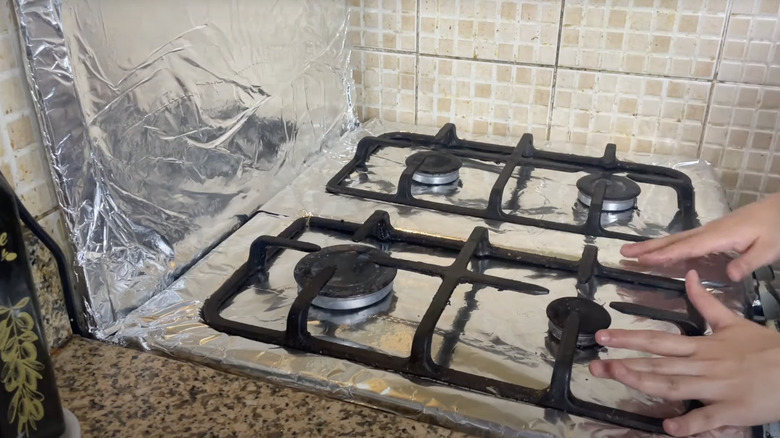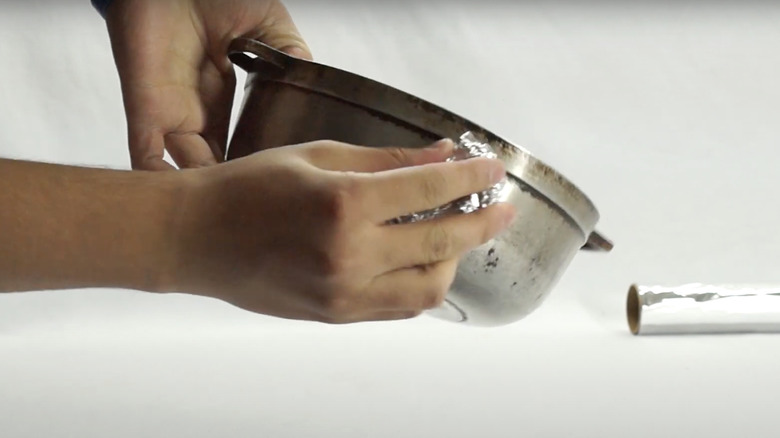All The Ways You Should Be Using Aluminum Foil To Clean Your House
We may receive a commission on purchases made from links.
One of the most common kitchen and houseware essentials is aluminum foil. It's especially useful for cooking and baking, but many individuals have also discovered ways to utilize it for DIY projects. It plays a direct and indirect role in cleaning various housewares, appliances, and equipment.
The most impressive aspect of this simple commodity is that it can be used on its own or alongside other cleaning tools and formulas to clean a wide range of objects. It creates nontoxic chemical reactions that effectively remove all sorts of debris buildup, from old food to corrosive rust. Learn more below about how you can use foil to cleanse and prevent buildup in kitchens, bathrooms, outdoor areas, and other spaces. Many of these methods require few other supplies and are great options for people on a budget.
Roll it in a ball to scrub grime from your oven door
The one downside of cooking at home is that your oven gets messier, and there's likely a buildup of oil, grease, and other food debris on the inner side of the glass door. A combination of hot water, baking soda, and aluminum foil can clear this right up because of the water's heat and baking soda's abrasive qualities. When mixed together, they interact with the aluminum to loosen the grime. Foil has a tough and sharp composition that scrapes through the weakened buildup, and when you combine the methods, it's very effective no matter how many months you've put off cleaning.
Instead of using a chemical-laden oven cleaner, prep your cleaning area by laying towels under and around your opened oven door. Pour a ¾ cup of hot water on the glass and sprinkle one or two tablespoons of baking soda on top. Take a single sheet of aluminum foil, roll it into a ball, and use it to scrape the residue from the glass.
Move the foil ball in gentle, circular motions to get the best results, and wipe over scrubbed areas occasionally with a paper towel to soak up the loosened particles. Don't rub too aggressively; you'll risk scratching the glass window. You may need to repetitively pour hot water and baking soda if there are multiple layers of residue to remove.
Lay it at the bottom of your oven or fireplace to collect ash
You may recognize this tip from what your parents or other family did when you were growing up. Many people lay foil sheets at the bottom of their ovens or fireplaces as an effective way to catch ash and debris. With deeper research, you'll find aluminum foil is a conductor of heat. It also holds its shape despite temperature fluctuations and is non-toxic. This makes it safe to use with heated appliances as long as you take precautionary measures.
Unroll aluminum foil and tear it at an appropriate length to lay along the bottom of these appliances. Ensure you don't obstruct ventilation in ovens or directly touch the coals in fireplaces. When debris starts building up, swap out the aluminum sheet for a new, clean one. Above all else, make sure the foil isn't coated with adhesive or any other flammable additives.
Turn it into a cleaning pad to remove tarnish from decorative hardware and jewelry
Fine and costume jewelry become tarnished over time, no matter how carefully you store them. Stainless steel and silver are common metals that make up many jewelry pieces. Combining them with aluminum foil, water, baking soda, and (optionally) vinegar causes a chemical reaction that removes the rust.
Get started on your silverware by heating a half gallon of water until it boils. Pour the boiling water into an aluminum foil-lined pan in your sink and add a half cup of baking soda. Place your silver jewelry in the pan, and the tarnish should dissolve after a few minutes. Ensure you let the water cool or carefully dump it out before removing the jewelry and drying it thoroughly.
Cleaning stainless steel is a similar process but with vinegar added to the mix. Use any vinegar with 6% to 8% acetic acid, such as apple cider or white, which will combine with aluminum foil to dissipate iron oxide molecules. This sounds scientific, but all you need to do is line a bowl with aluminum foil, add a half cup of vinegar and a few tablespoons of baking soda, and swirl the stainless steel jewelry in the mix. Remove the jewelry, rub away the remaining tarnish, and dry it off before returning it to storage.
Clean caked debris from grill and oven grates
Even with foil protecting the bottom surface, ovens and grills can still be dirtied by spilled food. It's common for their grates to get caked from small spills and oil and grease buildup. Luckily, these wires are usually made from stainless steel, meaning aluminum foil again plays a useful role in scrubbing them clean.
Rip off a small section of aluminum foil and curl it into an imperfect ball. Turn on your oven or grill for a few minutes to heat some of the debris before turning it off and working on the residue. Special cleaning formulas will help, but only use them if you're in a ventilated area. Be careful not to touch the grates as you clean them since they're hot enough to cause injury. It may help to invest in a pair of heat-resistant gloves to complete this task, such as this $8.48 pair from Home Depot.
Throw it in the dishwasher to polish dishes and flatware
You may have seen the popular TikTok cleaning hack where people put aluminum foil in their dishwasher. This "hack" allegedly polishes your silver dishes and flatware without any additional work on your behalf. The aluminum interacts with the dishwashing cleaning formula, causing the oxidization process that removes tarnish.
Be warned that if you don't follow these directions exactly, the aluminum foil can scratch and damage the inside of your dishwasher and the dishes within. Fold the aluminum foil into a ball without ripping it into any small pieces, and trap it in a lidded cutlery basket. Cutlery baskets are pre-installed in many dishwasher models, but if you don't have one, you can get it for as low as $14.99 on Amazon. Simply lock it in the basket and run your dishwasher as normal to see this trick work for yourself.
Fold it to scrape hard-to-reach places in kitchens
Many hidden nooks and crannies in kitchens are hard to reach and clean. One of the most notorious places is the crack between your stove and the countertop. Luckily, you can reach this difficult space using a simple sheet of aluminum foil, which has a thin but sturdy composition that holds its shape.
Start by measuring the length of the space between your stovetop and countertop. Unroll a strip of aluminum foil to a few inches longer than that length. Fold the width over several times until it's heavy enough to scoop out the debris trapped in this narrow space. Curve the sides to create a canoe-like shape that will trap debris as you slide your impromptu tool. Slowly move the foil and slide the remains toward where you're standing. Either sweep or vacuum to remove all evidence of the dirt and crumbs.
Use it to hold bar soap and prevent a gooey mess
Aluminum foil can also be used to prevent messes on countertops and around your sink and bathtub. Soap bars often leave a greasy residue on surfaces, but by placing it on a small sheet of aluminum foil, you'll keep the soap and your countertop clean. Foil is impermeable and nontoxic, meaning you don't have to worry about the soap leaching dangerous chemicals or suds seeping through the sheet.
This trick is about as low effort as you can go. All you need to do is rip off a piece of aluminum foil big enough to place underneath a soap bar. Fold up the edges to keep excess moisture and suds from rolling over them. If you have an eye for interior design and don't just want your soap sitting on the counter, you can always buy a soap holder off Amazon and fold the aluminum foil inside of it to make a more aesthetically pleasing setup.
Repurpose it to remove rust from shower fixtures
Stainless steel and bathtub fixtures are prone to rust over time simply because they are consistently exposed to water and humidity. Using a combination of foil, vinegar, and baking soda creates a chemical reaction that dissolves iron oxide– also known as rust. While many specialized cleaning formulas on the market are designed to do the same thing, this process is more natural and doesn't require as many artificial chemicals.
First, wipe down any loose dirt or mold from your shower rod and appliances using a dry paper towel. Dip a folded sheet of aluminum foil in white vinegar, then use the sheet to rub rust from all tarnished stainless steel areas. Depending on how high the build-up is, it may take a few rounds, but you should have sparkling bathroom fixtures in no time.
Line your stovetop burners with it and replace as needed
In addition to lining your oven, fireplace, and soap bar holders, you can also lay foil over a gas-burning stovetop. Since foil conducts heat and doesn't harbor or promote bacteria growth, it is an ideal protective layer for these traditional kitchen appliances. It'll catch any fallen crumbs or splattered oil, making cleanup easier after cooking elaborate meals.
Begin by removing the grates to lay large pieces of aluminum foil over the entire stovetop surface. If you typically only use one or two burners on your stovetop, you may just want to protect those areas to save foil and time. Press the foil against the stovetop to see where the burners are, and carefully cut out the foil obstructing them with a small paring or kitchen knife. The foil should not obstruct the burners nor their emitted flames when your stovetop fires up. Return the grates to their designated spots and use your stovetop like normal, occasionally replacing the foil as it becomes messy.
Remove hardened food glass, cast iron, and stainless steel bakeware and cooking pans
The most frustrating part of cooking a big meal is the cleanup. Bakeware and cookware get caked with oil, grease, and food debris that seems impossible to remove. Once again, you're in luck if you have non-coated stainless steel pots and pans, as these can be cleaned easily using an abrasive material like aluminum foil.
Crinkle a sheet of foil into a rough ball and use it to scrape away the hardened buildup. In especially tough situations, you can purchase Barkeeper's Friend, a cleaning solution at most big box stores, supermarkets, and home improvement shops. Sprinkle a bit of this cleaning formula on a wet pan; the grit makes scouring with foil even more effective.
Remember not to use this tip for nonstick or coated pans. Aggressively rubbing them clean with this combination of tools leads to small scratches in coated pans. These scratches flake off into cooking food and release toxic compounds, and it's not recommended for health reasons.
De-rust bicycles, skateboards, rollerskates, and other outdoor sports equipment
Seeing as indoor items are vulnerable to rust, it's unsurprising that outdoor belongings are even more susceptible to humidity and moisture. Sports gear, like bicycles, skateboards, roller skates, and other outdoor toys often run through puddles, humidity, rain, and other wet conditions, causing their metal pieces to tarnish over time. Luckily, stainless steel is a common metal used on this type of equipment, meaning aluminum foil will come in handy to clean the few metal bits.
This hack is especially effective on chrome-plated steel, which is extra resilient to wear and tear. All you'll need is foil, water, and a dry rag. Dip a crumbled ball of foil in water and gently scrub it against the rusted areas on your sports equipment. Once all the rust is removed, dry it thoroughly with a rag to prevent more rust from building right back up again.
